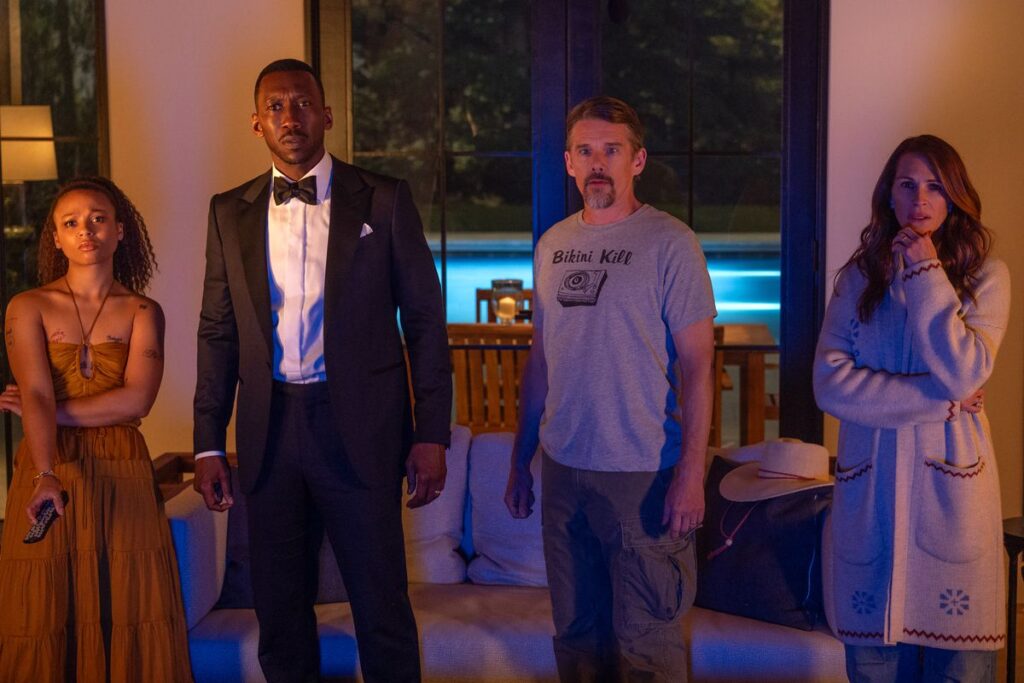
One of the best movies of the year. Okay, got that out of the way. And the reason for that is I read the NY Times review of it by Alissa Wilkinson before I watched it and it was rather negative. But my wife recommended it, and being a smart man, and a survivalist, I watched it. My wife is always right. Seriously.
Having made my living as a writer for over three decades, I understand how easy it is to poke holes in something if the initial reaction is negative. Which is what the reviewer did. Yes, the movie is very different than the book. In some ways, much better. The ending is certainly more uplifting. Bottom line—there’s a lot packed into every scene and not just the dialogue which can seem a bit didactic at times, but actually isn’t. There’s a lot of imagery in the background that sends a message. A lot. From the name of every place to the labels on the food stacked on the shelves in the survival bunker.
This is not a movie about how to survive the end of the world. It’s about the way people interact.
I’ve written a preparation and survival guide and am a former Green Beret. I know about prepping and survival and I will say this movie touched on the most fundamental aspects of it: the mindset. The ability to face things you don’t want to. To change when needed.
It also touched on what is a very possible way things fall apart: they fall apart.
Given the Obamas were executive producers on this movie adds an extra oomph to the part where Mahersala Ali talks about his rich client and the fact there is no secret cabal actually controlling things—that no one controls things. It mirrors the line from John Le Carre where he says the stunning thing in the covert world is to realize there is no inner room. We live in a precarious civilization made of cards and no one is running it. We’re all running it. I remember one time talking to a guy in another special operations unit and we both were wondering who was in the black helicopters doing all the high speed stuff, then we realized we were the ones in the black helicopters doing the high speed stuff, and if we were it, that’s kind of scary.
And our world as we know it is quite susceptible to falling apart. Here in the United States we are well on our way to falling apart. The most dangerous thing going on are those who willfully spread flat out lies, usually for their own enrichment. We have people who are anti-everything. Anti-mask, anti-vaccine, anti-science, anti-EV, anti-empathy, anti-government, the list goes on. Anger, hate and envy rule. And when that gets strong enough, things will fall apart. People like that don’t build. They destroy.
But, back to the movie. Logically there are fallacies if you stop and think about it. But the thing is, it plays out from the perspective of the people caught up in an event they don’t understand. The lack of information is one of the most debilitating things for modern people. When Ethan Hawke’s character essentially prostrates himself in front of Kevin Bacon telling him that without his cell phone and GPS he is a worthless man, it seems extreme. But there’s a lot of truth to it, but more importantly, it is the only way his character can get through to Kevin Bacon’s character and elicit the slightest bit of empathy and gets what he needs for his son. (BTW, yes, I have a whole section in my book on map reading and why you need paper maps and even a Youtube video about it—along with pretty much everything else covered in the film—and yes, you are probably woefully unprepared for even the most basic disaster).
Frankly, the most unrealistic part of the movie is the core: that a character like Julia Roberts, who opens the movie talking about how much she hates people, admits she hates herself for being like that. And she changes for the better. It is an uplifting message. I wish it were true.

Recent Comments